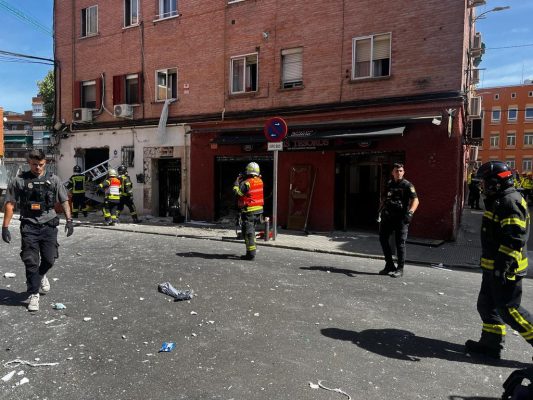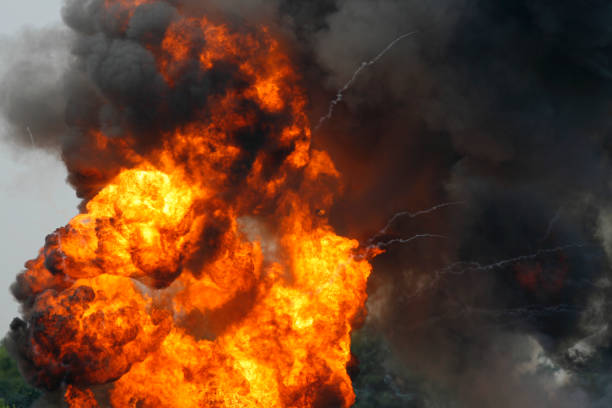Residents in Madrid were left shaken on Saturday after a powerful explosion tore through a bar in the bustling Vallecas neighbourhood, resulting in injuries to at least 21 people, with three reported in critical condition, according to Spanish emergency services. The incident, which occurred in one of the Spanish capital’s lively districts, has drawn widespread attention across Europe and beyond, raising important questions about urban safety and emergency response protocols.
Madrid’s emergency services provided updates on the aftermath via their official X (formerly Twitter) account, sharing visuals that captured the scale of the destruction — from collapsed portions of the ceiling to scattered bricks and debris strewn across the premises. Doors were blasted from their frames, while broken glass covered sidewalks and streets, painting a scene of chaos and urgency. First responders were observed swiftly evacuating victims on stretchers, underscoring the seriousness of the explosion.
Eyewitnesses in the Vallecas district described a “thunderous noise” followed by confusion and panic as nearby businesses scrambled to secure their properties and bystanders sought safety. One local barista, speaking to Spanish media, said, “We felt the whole building shake. At first, we thought it was an earthquake.”
According to official statements released shortly after the event, a combined force of civil protection units and medical teams responded rapidly, providing care to 21 individuals at the scene. Of those affected, three have been classified in “serious” condition, while two others are considered “potentially serious.” Medical practitioners emphasized the importance of timely intervention, citing that quick transportation to local hospitals likely prevented more severe outcomes.
In an effort to ensure no one was trapped under the rubble, authorities deployed both sniffer dogs and drones to thoroughly search the affected site. These high-tech and animal-assisted methods reflect a growing trend in emergency responses in developed cities. Drones proved particularly useful, allowing responders to map damage from above and identify any pockets in the debris where survivors might be located.
What Caused the Explosion?
While investigations are still ongoing as of press time, initial analysis from the local fire brigade points to a possible gas leak as the cause—a risk factor that remains a concern in many urban settings, including Lagos, Accra, and other fast-growing African cities. According to Madrid’s emergency spokesperson, fire investigations have not ruled out human error or technical malfunction, but all angles are being considered.
Such incidents are a stark reminder for Nigerian and West African cities, where urban expansion and accelerated construction can sometimes outpace proper adherence to safety regulations. In 2023, Lagos state authorities reported a rise in fire outbreaks and explosions attributable to poor gas line installations and insufficient maintenance in high-density areas. Experts have repeatedly called for stricter oversight and public awareness campaigns to mitigate similar hazards on the continent.
Emergency Response: Echoes Across Continents
The speed with which Madrid’s first responders managed to control the scene and support the injured has been commended by health and security analysts worldwide. Lagos-based emergency response consultant, Dr. Ajayi Moshood, notes: “Improving our emergency response systems in Nigeria hinges not only on equipment but also workforce training and timely community alerts. Lessons from cities like Madrid are extremely relevant.”
In Ghana, too, where recent years have seen high-profile gas explosions—the 2017 Accra Atomic Junction blast standing out—authorities and local communities alike have increased calls for rigorous hazard inspections and rapid-response drills. “Preparedness is key. These rare but catastrophic events show the need for continuous investment in emergency services and strict monitoring of businesses that use flammable gases,” explained a Ghanaian safety advocate.
Social Impact: Local and Global Reactions
As news of the Madrid explosion spread, messages of solidarity poured in from both local residents and international communities. Nigerian students and professionals living in Spain expressed concern and shared information on private WhatsApp groups to ensure the safety of friends and family. Community groups in Lagos and Abuja have also pointed out the parallels to similar urban tragedies back home, using the Madrid incident as a case study to demand better safety practices from local businesses and government agencies.
- High-density neighbourhoods remain most vulnerable to such explosions due to proximity of residences and businesses.
- Nigerian and Ghanaian cities face comparable challenges, including outdated infrastructure and enforcement gaps.
- Recent property and fire code reforms in these countries aim to instill stricter compliance and increased transparency.
Global responses have also addressed the psychological impact of such disasters, especially on survivors, their families, and witnesses. Experts have stressed the need for support systems and post-trauma counseling, a recommendation that resonates well with advocacy groups in West Africa pushing for more holistic disaster management strategies.
What Can Nigerian and African Cities Learn?
Madrid’s handling of the explosion provides several key takeaways for stakeholders across West Africa. Chief among these are:
- Stringent Building Inspections: Routine checks of gas installations and electrical layouts in bars, restaurants, and other commercial spaces can significantly reduce the risk of accidental explosions.
- Integrated Emergency Systems: The use of digital alerts, drones, and canine units showcases best practices that could be adapted to Nigeria’s growing urban centres.
- Public Education: Empowering citizens to identify hazards, report leaks, and follow evacuation protocols can save lives.
The Madrid explosion echoes recent tragedies in West Africa, such as the 2022 fire at a popular Ibadan market and recurring pipeline blasts in Port Harcourt. Each event, experts say, reinforces the need for continuous investment in both technology and human resources to improve the outcome of such emergencies.
Recovery efforts in Madrid continue, with officials pledging to conduct a thorough investigation and adopt any necessary reforms to prevent a repeat. The local government has also promised to support those injured and affected, both emotionally and materially—a gesture community leaders in Nigeria and Ghana argue must be standard practice at home as well.
Looking Ahead: Building Safer Cities Together
Urban safety remains an evolving challenge as cities expand and modernize. The Madrid explosion stands as a distressing event but also serves as a learning moment for city administrators, business owners, and residents in Africa and worldwide. Continuous dialogue, strict enforcement of standards, and openness to technological solutions are essential to prevent future tragedies and ensure the well-being of urban populations.
How do you feel about disaster preparedness and emergency services in your community? What more can local authorities, businesses, and citizens do to stay safe and reduce risks in densely populated areas? Drop your thoughts in the comments below and follow us for more in-depth analysis and updates on important stories affecting you.
Have a story you want to share or sell? We’d love to hear from you! Email us at story@nowahalazone.com to get your story featured or discuss story sales.
For general support, reach out at support@nowahalazone.com.
Follow us on Facebook, X (Twitter), and Instagram for verified updates and more local news.
Your voice matters. Share your opinions, experiences, or tips, and let’s build a safer, smarter community together!









